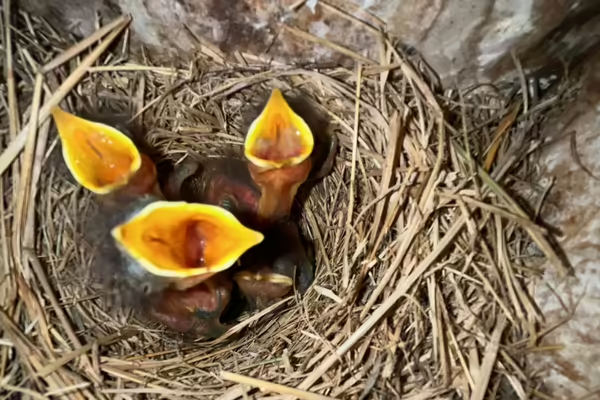
Author: Carla Rich Montez, Illinois Extension Master Naturalist
LEWISTOWN, Ill. - It’s not easy to be a bluebird family. Aggressive birds discourage nesting; predators steal eggs and chicks; competing cavity nesters claim the boxes; insects attack featherless hatchlings. Even the weather impacts bluebirds. Altogether, these conditions will result in bluebird mortality.
Fortunately, a group of University of Illinois Extension Master Naturalists, serving Fulton, Mason, Peoria, and Tazewell counties, are doing their part. At several parks in the region, seven master naturalists are spending their summer monitoring a set of nesting boxes.
Stewarding a bluebird trail begins in the spring when birds start mating. Volunteers begin the weekly process of monitoring the nesting boxes.
According to Cindy Intravartolo, who volunteers at Wildlife Prairie Park, “Usually, 13-14 days after the last egg is laid… all [the eggs] hatch on the same day. The babies fledge approximately 17-21 days after hatching. When the nest is empty, it is cleaned out for the next brood.” From the eight boxes Cindy has monitored this summer, nearly 40 bluebirds have fledged to date.
At McNaughton Park, EMNs Dina Pettit and Randy Turner monitor five bluebird nesting boxes. According to Dina, one particular set of bluebird parents was especially protective of their nest this summer “…flying over the box and chattering at intruders…They are such good parents.” So far, Dina and Randy have welcomed 27 new bluebirds to Pekin this year.
In Peoria, EMNs Cathy Curtis and Tom Mengel are enjoying the ten bluebird boxes they monitor at Donovan Park. “Sometimes the bluebirds build [nests] and lay eggs faster than we can catch them.” As they continue their stewardship at Donovan this summer, Cathy and Tom have enjoyed the fledging of 15 bluebirds...and counting!
Just north of Peoria, Peggy West monitors the bluebird nesting box trail at Tawny Oaks Field Station. Peggy thoroughly enjoys watching the bluebirds, but she also appreciates the prairie where the nesting boxes are located. “I have truly enjoyed seeing the changes in the prairie,” said Peggy. “It’s exciting to observe the new blooms, butterflies, and other bird species. I'm really loving this work.” Peggy’s stewardship has already resulted in nearly 40 bluebird fledglings at Tawny Oaks.
At three locations in Peoria, Sommer Farm, Detweiller Nature Area, and Robinson Park, Carla and Steve Montez monitor 25 nesting boxes each week. “In a good year, each box will produce two clutches of bluebirds,” said Carla, “but this year, we have a few boxes that are on their fourth brood. Before the season ends, we could end up with about 120 fledglings this summer. Amazing!”
What’s equally amazing is that Extension Master Naturalists are helping bluebird populations grow. Thanks to their collective efforts, almost 240 new fledglings will join the growing population of bluebirds now nesting in the region. And since bluebirds often return to their birth site to nest in subsequent seasons, their numbers are well underway for 2024.
Photo cutline
Three bluebird hatchlings were able to safely hatch and fledge the nest in Peoria thanks to volunteer efforts by local Extension Master Naturalists. Throughout the four-county unit, seven volunteers have monitored nesting boxes and counted 240 bluebirds that safely left the nest. If nature follows course, they will return to the same nest next year.
Illinois Extension leads public outreach for University of Illinois by translating research into action plans that allow Illinois families, businesses, and community leaders to solve problems, make informed decisions, and adapt to changes and opportunities. Illinois Extension is part of the University of Illinois Urbana-Champaign College of Agricultural, Consumer and Environmental Sciences.